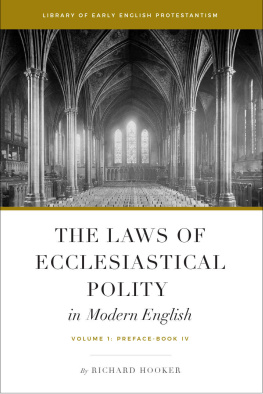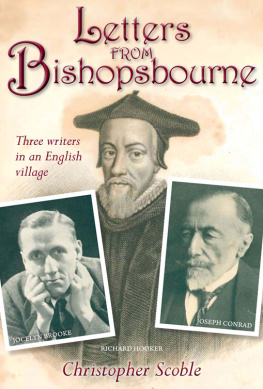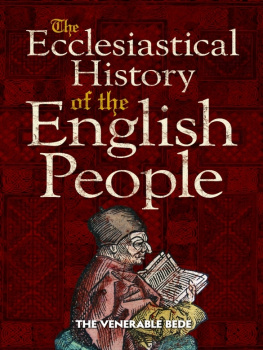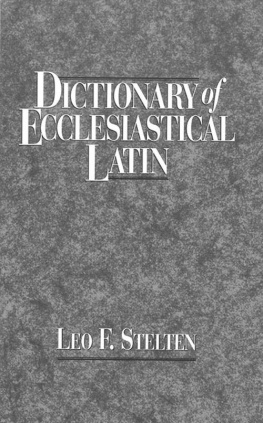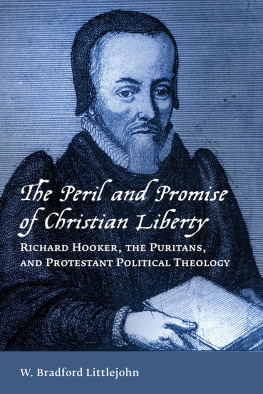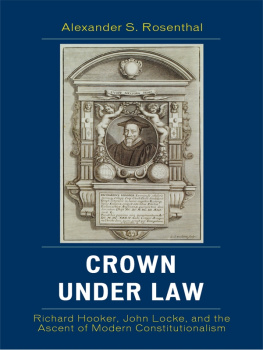Richard Hooker - The Laws of Ecclesiastical Polity In Modern English, Vol. 1
Here you can read online Richard Hooker - The Laws of Ecclesiastical Polity In Modern English, Vol. 1 full text of the book (entire story) in english for free. Download pdf and epub, get meaning, cover and reviews about this ebook. year: 2019, publisher: The Davenant Press, genre: Religion. Description of the work, (preface) as well as reviews are available. Best literature library LitArk.com created for fans of good reading and offers a wide selection of genres:
Romance novel
Science fiction
Adventure
Detective
Science
History
Home and family
Prose
Art
Politics
Computer
Non-fiction
Religion
Business
Children
Humor
Choose a favorite category and find really read worthwhile books. Enjoy immersion in the world of imagination, feel the emotions of the characters or learn something new for yourself, make an fascinating discovery.
- Book:The Laws of Ecclesiastical Polity In Modern English, Vol. 1
- Author:
- Publisher:The Davenant Press
- Genre:
- Year:2019
- Rating:3 / 5
- Favourites:Add to favourites
- Your mark:
- 60
- 1
- 2
- 3
- 4
- 5
The Laws of Ecclesiastical Polity In Modern English, Vol. 1: summary, description and annotation
We offer to read an annotation, description, summary or preface (depends on what the author of the book "The Laws of Ecclesiastical Polity In Modern English, Vol. 1" wrote himself). If you haven't found the necessary information about the book — write in the comments, we will try to find it.
The Laws of Ecclesiastical Polity In Modern English, Vol. 1 — read online for free the complete book (whole text) full work
Below is the text of the book, divided by pages. System saving the place of the last page read, allows you to conveniently read the book "The Laws of Ecclesiastical Polity In Modern English, Vol. 1" online for free, without having to search again every time where you left off. Put a bookmark, and you can go to the page where you finished reading at any time.
Font size:
Interval:
Bookmark:
Praise for The Laws of Ecclesiastical Polity in Modern English
This modernization is an incomparable resource for those of us trying to help new readers understand Richard Hooker and the English Reformation as it really happened. Richard Hooker is worth the considerable effort to read and to understand, but the task is a daunting one, and has turned away many who would delight and learn from the wily scholar and pastor. Here we have an accessible, quickly graspable text, that is in no way dumbed down for beginners. Rather, we have an elevated text, informed by considerable research, that makes us all want to read on, whether we have come to terms with the decorated and beautiful text Hooker left us or not. Words that have changed their meaning, and rhetorical devices that have lost their currency are undated in a seamless and readable version. Others have tried to do this, but without the success we can enjoy here.
Rev. Dr. David Neelands, Dean Emeritus of Divinity at Trinity College, University of Toronto.
The retrieval of Richard Hooker as a leading interlocutor for reformed theology is well and truly in full swing. With this excellent new translation, readers are given an impressive and accessible entre to a figure whose thought has oftentimes been enlisted to prove and defend a whole host of differing positions. This new volume invites the reader to analyze Hooker's hermeneutic for themselves, to trace his thinking on key topics that touch down directly on current theological debates, and to engage one of the most significant theologians of Protestant theology.
Rev. Dr. Mark McDowell, Executive Director of RTS-Dallas and Assistant
Professor of Systematic Theology.
Richard Hooker was undoubtedly Anglicanisms greatest theologian in its most embattled century, the sixteenth. His way of charting a via media between Rome and Geneva continues to be the most careful guide to Anglican method and sensibility. Three cheers for this new translation that makes this great English mind accessible to later generations. It is akin to a clear and melodious new translation of Aquinas Summa Theologica .
Rev. Dr. Gerald McDermott, Professor of Anglican Studies, Beeson Divinity School.
Richard Hooker wrote his Laws of Ecclesiastical Polity in order to preserve and pass on wisdom to posterity, that this wisdom might not pass away as in a dream. Sadly, his wisdom is hardly remembered by the present church. This amnesia in theology is deadly, because when we cannot recall lessons learned in the past, we inevitably act like fools. Hooker's wisdom is one much-needed antidote to our current follies. Although his original language is elegant, it is arduous for the contemporary reader; these modernizations deliver his wisdom whole and hearable. Take it and read it, and recall a wisdom worth remembering.
Rev. Dr. James Salladin, Rector of Emmanuel Anglican Church, New York City.
Littlejohn, Belschner, Marr, and Duncan offer a readable and straightforward rendition of the Preface and first four books of the Laws which is suitable for college students, or anyone seeking an introduction to Reformed theology. They have taken the elaborate labyrinths of Hookers prose and turned it into simple, agreeable, contemporary prose, and for that reason the editors ought to be commended for so capably maintaining the sense of what Hooker wrote. This edition will introduce Hookers subtle and persuasive arguments about the relationship of faith to reason to a new generation of readers, and to Richard Hooker himself, the learned theologian who has been regarded throughout the centuries as one of the great apologists of the faith.
Dr. Roberta Bayer, Associate Prof. of Government, Patrick Henry College; former editor, Anglican Way Magazine.
As an Anglican priest who regularly teaches church history, and especially our Reformation heritage to my congregations, I welcome Davenant's new modern rendering of Hooker's Laws. With the passage of time, Hooker's glorious prose has become increasingly impenetrable for the modern interested reader. Davenant's faithful and readable translation is a welcome ministry tool for acquainting modern congregations with the riches of our Elizabethan Anglican theological heritage and the unique genius of our worthiest of divines, Richard Hooker.
The Rev'd Daniel F. Graves, Parish Priest, Diocese of Toronto and Assistant Director of the Richard Hooker Society
The Laws of Ecclesiastical Polity
The Laws of Ecclesiastical Polity
in Modern English
by Richard Hooker
Edited by Bradford Littlejohn, Bradley Belschner, and Brian Marr, with Sean Duncan
Copyright 2019 The Davenant Institute
All rights reserved.
Front cover image taken from Interior of Temple Church, City of London, c. 1860c. 1922 (English Heritage)
Cover design by Rachel Rosales, Orange Peal Design
CONTENTS
THE NATURAL LAW
INTRODUCTION
Bradford Littlejohn
THOUGH FOR NO other cause, but for thisthat posterity may know we have not loosely through silence permitted things to pass away as in a dreamthus Hooker opens his great Laws of Ecclesiastical Polity , and we might fittingly take these lines as our own, in explaining the need for this translation. It might more conventionally be called a modernization, though this usually implies something more minimal, confined to alterations of spelling, punctuation, and not that much more, whereas translation is usually reserved for the rendering of a text from one language into another. Here, however, we have taken a masterpiece of English theological writingstylistically for its purpose, perhaps the most perfect in English , in the judgment of C.S. Lewisand rendered it in contemporary English prose.
The need for such a boldeven brazenundertaking can be summarized in those haunting opening lines of the Laws . If we are not careful, this magnum opus of English Protestant theology might be permitted to pass away as in a dream, as the slow but steady flow of linguistic development bears us ever onward and leaves 16 th -century prose far behind on distant shores. Hooker deservesdemandsto be read, and by and large he is not anymore. In our consistent experience, at least one key reason why people no longer read him is because they cannot read him; not, at any rate, without great effort and risk of miscomprehension. This should hardly surprise us; the English language has after all changed quite a bit in the last 430 years. English literature majors who have cut their teeth on Shakespeare may be an exception, but often even they are lost amidst the dense thicketsor perhaps we should say the elaborate labyrinthsof his prose. Hooker, after all, was (in)famous even amongst his contemporaries for his distinctive prose style, long and pithy, driving a whole flock of several clauses before he came to the close of a sentence. Magnificent the style may be, but accessible it is not, especially when many of the words employed have changed their meaning subtly over the centuries.
If Hooker were merely an also-ran among the theological polemicists who wore out the printing presses of Elizabethan England, a third-rate thinker of merely antiquarian interest, this growing language barrier need not trouble us so much. But there is a good case to be made that he ranks third only to Luther and Calvin in both intellectual stature and historical significance among Protestant theologians, and surpasses both in his treatment of matters of law and liturgy. Luther and Calvin are not reserved for specialist scholars nowadays, but are read widely by theologians, students, and ordinary Christians. Why? Because of great translation efforts undertaken in the past century and a half to render them in contemporary English. The riches of the English Reformation, on the other hand (and Hooker foremost among them) are receding rapidly from our contemporary consciousness, as 16 th -century English increasingly becomes almost as alien to us as a foreign language.
Next pageFont size:
Interval:
Bookmark:
Similar books «The Laws of Ecclesiastical Polity In Modern English, Vol. 1»
Look at similar books to The Laws of Ecclesiastical Polity In Modern English, Vol. 1. We have selected literature similar in name and meaning in the hope of providing readers with more options to find new, interesting, not yet read works.
Discussion, reviews of the book The Laws of Ecclesiastical Polity In Modern English, Vol. 1 and just readers' own opinions. Leave your comments, write what you think about the work, its meaning or the main characters. Specify what exactly you liked and what you didn't like, and why you think so.

